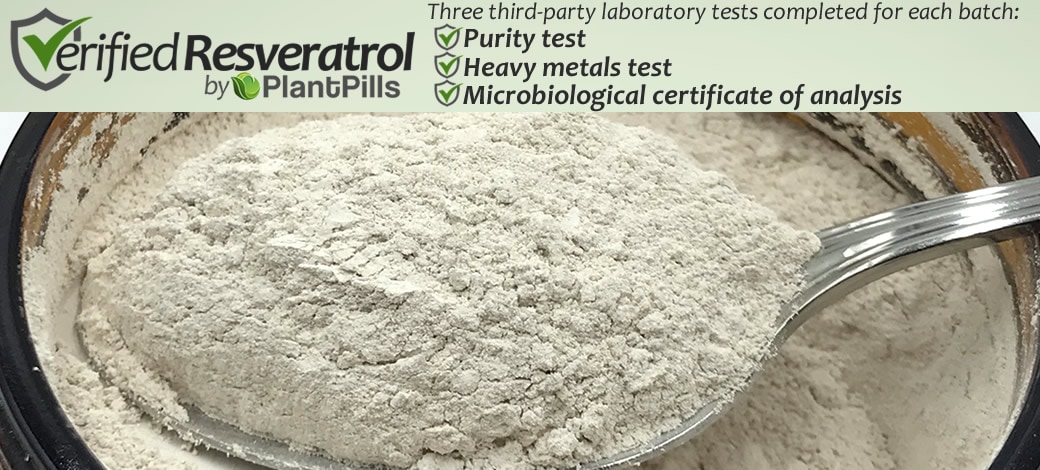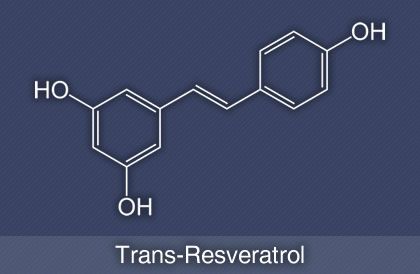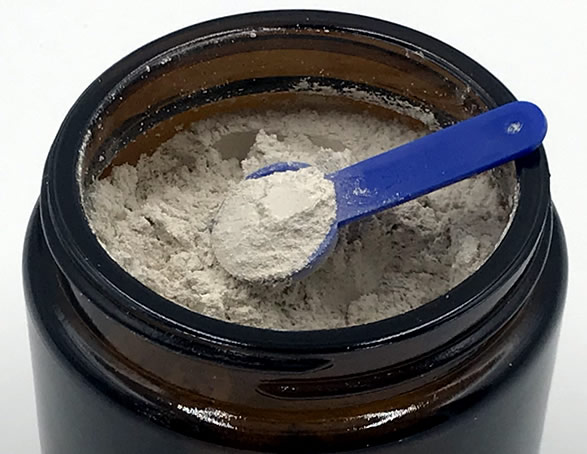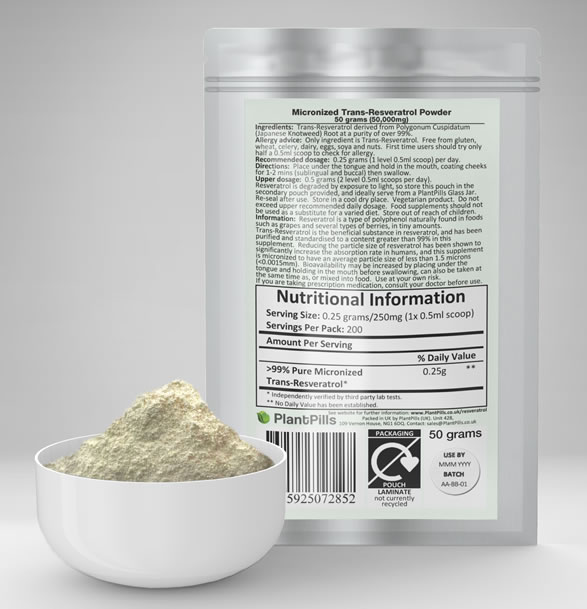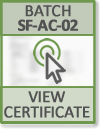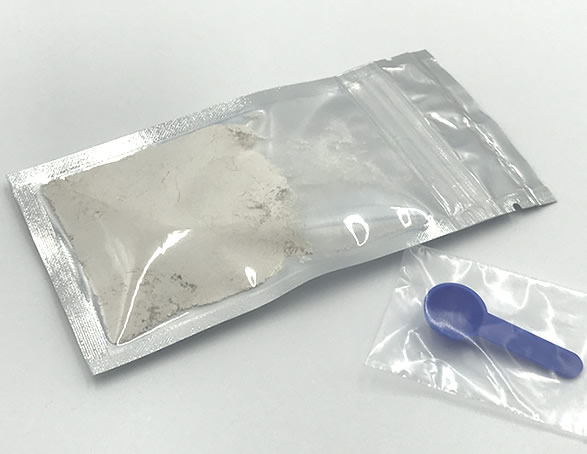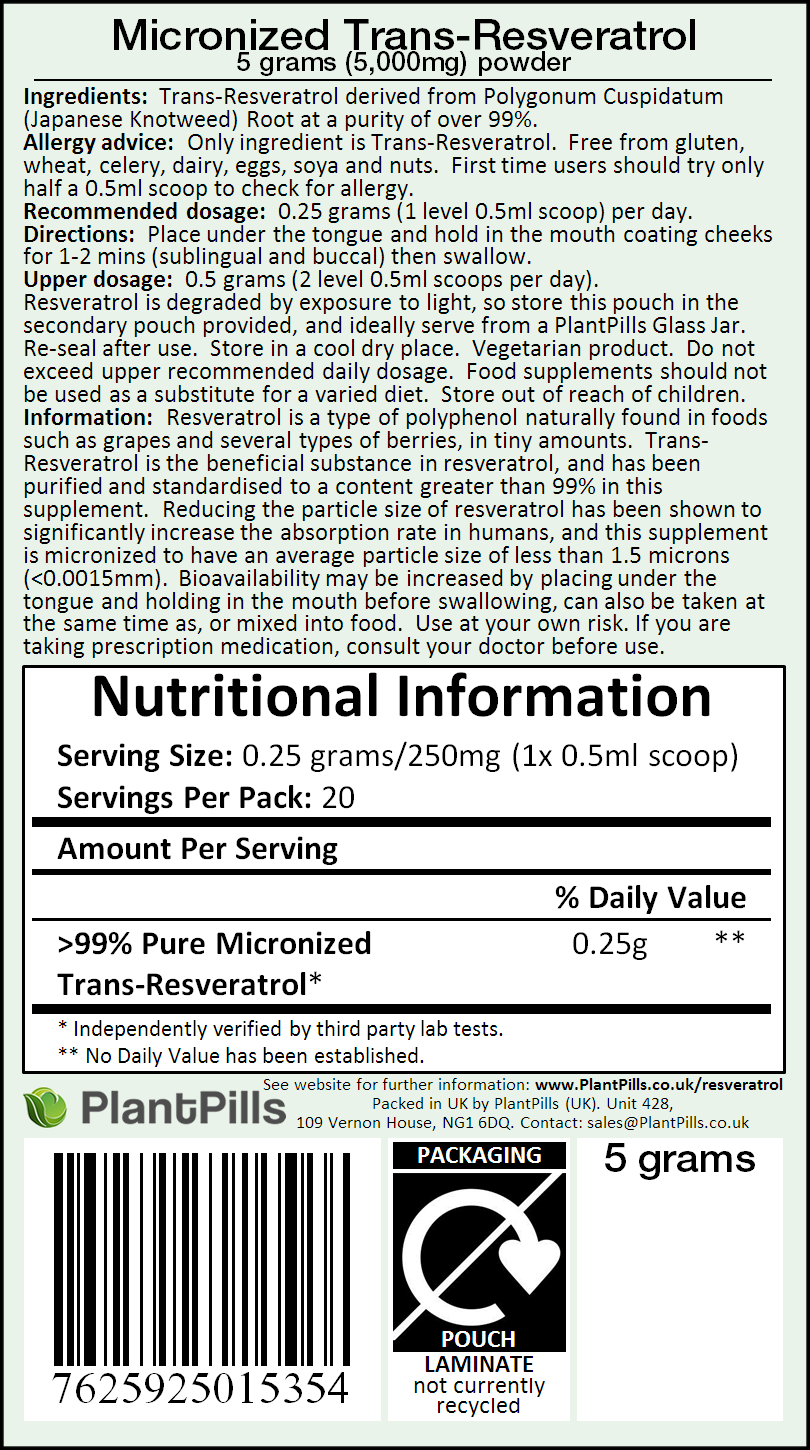Please find all sources and references listed below. Archived versions are included in the event that the original material is changed, moved or removed. Please note that none of these sources are affiliated with PlantPills.
For video or audio in addition to these written sources, an excellent overview of NMN, NAD, sirtuins and resveratrol
can be watched in the YouTube video here, which was originally streamed live by Joe Rogan on 29th January 2019, lasting 2 hours and 20 minutes.
A more in-depth and technical conversation on the subject
can be found here, which was recorded by Peter Attia on 5th November 2018, lasting 1 hour and 40 minutes.
|
1
|
All foods in which the polyphenol Resveratrol is found, [mirror]
Phenol-Explorer, Database on polyphnol content in foods
2019
|
|
2
|
Occurrence of resveratrol and pterostilbene in age-old darakchasava, an ayurvedic medicine from India., [mirror]
Paul B, Masih I, Deopujari J, Charpentier C.
J Ethnopharmacol. 1999 Dec 15;68(1-3):71-6.
|
|
3
|
CHEMICAL CONSTITUENTS OF POLYGONACEOUS PLANTS. I. STUDIES ON THE COMPONENTS OF KO-J O-KON. (POLYGONUM CUSPIDATUM SIEB. ET ZUCC.), [mirror]
NONOMURA S, KANAGAWA H, MAKIMOTO A.
Yakugaku Zasshi. 1963 Oct;83:988-90. Japanese.
|
|
4
|
An antiplatelet principle of Veratrum formosanum., [mirror]
Chung MI, Teng CM, Cheng KL, Ko FN, Lin CN.
Planta Med. 1992 Jun;58(3):274-6.
|
|
5
|
Quest for youth drives craze for 'wine' pills, [mirror]
Zachary M. Seward, The Wall Street Journal
Pittsburgh Post-Gazette, November 30, 2006
|
|
6
|
Resveratrol improves health and survival of mice on a high-calorie diet, [mirror]
Baur JA, Pearson KJ, Price NL, Jamieson HA, Lerin C, Kalra A, Prabhu VV, Allard JS, Lopez-Lluch G, Lewis K, Pistell PJ, Poosala S, Becker KG, Boss O, Gwinn D, Wang M, Ramaswamy S, Fishbein KW, Spencer RG, Lakatta EG, Le Couteur D, Shaw RJ, Navas P, Puigserver P, Ingram DK, de Cabo R, Sinclair DA.
Nature. 2006 Nov 16;444(7117):337-42. Epub 2006 Nov 1.
|
|
7
|
Resveratrol modulates drug- and carcinogen-metabolizing enzymes in a healthy volunteer study., [mirror]
Chow HH, Garland LL, Hsu CH, Vining DR, Chew WM, Miller JA, Perloff M, Crowell JA, Alberts DS.
Cancer Prev Res (Phila). 2010 Sep;3(9):1168-75. doi: 10.1158/1940-6207.CAPR-09-0155. Epub 2010 Aug 17.
|
|
8
|
Properties of Resveratrol: In Vitro and In Vivo Studies about Metabolism, Bioavailability, and Biological Effects in Animal Models and Humans, [mirror]
Gambini J, Inglés M, Olaso G, Lopez-Grueso R, Bonet-Costa V, Gimeno-Mallench L, Mas-Bargues C, Abdelaziz KM, Gomez-Cabrera MC, Vina J, Borras C.
Oxid Med Cell Longev. 2015;2015:837042. doi: 10.1155/2015/837042. Epub 2015 Jun 28. Review.
|
|
9
|
Resveratrol and Clinical Trials: The Crossroad from In Vitro Studies to Human Evidence, [mirror]
Tomé-Carneiro J, Larrosa M, González-Sarrías A, Tomás-Barberán FA, García-Conesa MT, Espín JC.
Curr Pharm Des. 2013;19(34):6064-93. Review.
|
|
10
|
Concentration of the Phytoalexin Resveratrol in Wine, [mirror]
E. H. Siemann, L. L. Creasy
Am J Enol Vitic. January 1992 43: 49-52; published ahead of print January 01, 1992
|
|
11
|
Cancer chemopreventive activity of resveratrol, a natural product derived from grapes., [mirror]
Jang M, Cai L, Udeani GO, Slowing KV, Thomas CF, Beecher CW, Fong HH, Farnsworth NR, Kinghorn AD, Mehta RG, Moon RC, Pezzuto JM.
Science. 1997 Jan 10;275(5297):218-20.
|
|
12
|
Caloric Restriction Mimetics Slow Aging of Neuromuscular Synapses and Muscle Fibers , [mirror]
Jessica Stockinger Nicholas Maxwell Dillon Shapiro Rafael deCabo Gregorio Valdez
The Journals of Gerontology: Series A, Volume 73, Issue 1, 1 January 2018, Pages 21–28
|
|
13
|
Improvements in skeletal muscle strength and cardiac function induced by resveratrol during exercise training contribute to enhanced exercise performance in rats, [mirror]
Dolinsky VW, Jones KE, Sidhu RS, Haykowsky M, Czubryt MP, Gordon T, Dyck JR.
J Physiol. 2012 Jun 1;590(11):2783-99. doi: 10.1113/jphysiol.2012.230490. Epub 2012 Apr 2.
|
|
14
|
trans-Resveratrol relaxes the corpus cavernosum ex vivo and enhances testosterone levels and sperm quality in vivo, [mirror]
Shin S, Jeon JH, Park D, Jang MJ, Choi JH, Choi BH, Joo SS, Nahm SS, Kim JC, Kim YB.
Arch Pharm Res. 2008 Jan;31(1):83-7.
|
|
15
|
Resveratrol Increases Intracellular NAD+ Levels Through Up regulation of The NAD+ Synthetic Enzyme Nicotinamide Mononucleotide Adenylyltransferase, [mirror]
Ross S. Grant
University of New South Wales, Pharmacology, 5 May 2010
|
|
16
|
Resveratrol-Induced AMP-Activated Protein Kinase Activation Is Cell-Type Dependent: Lessons from Basic Research for Clinical Application, [mirror]
Lan F, Weikel KA, Cacicedo JM, Ido Y.
Nutrients. 2017 Jul 14;9(7). pii: E751. doi: 10.3390/nu9070751.
|
|
17
|
Therapeutic potential of resveratrol: the in vivo evidence., [mirror]
Baur JA, Sinclair DA.
Nat Rev Drug Discov. 2006 Jun;5(6):493-506. Epub 2006 May 26. Review.
|
|
18
|
Calorie restriction-like effects of 30 days of Resveratrol (resVida™) supplementation on energy metabolism and metabolic profile in obese humans, [mirror]
Timmers S, Konings E, Bilet L, Houtkooper RH, van de Weijer T, Goossens GH, Hoeks J, van der Krieken S, Ryu D, Kersten S, Moonen-Kornips E, Hesselink MKC, Kunz I, Schrauwen-Hinderling VB, Blaak E, Auwerx J, Schrauwen P.
Cell Metab. 2011 Nov 2;14(5):612-22. doi: 10.1016/j.cmet.2011.10.002.
|
|
19
|
Regulation of SIRT1 in cellular functions: role of polyphenols, [mirror]
Chung S, Yao H, Caito S, Hwang JW, Arunachalam G, Rahman I.
Arch Biochem Biophys. 2010 Sep 1;501(1):79-90. doi: 10.1016/j.abb.2010.05.003. Epub 2010 May 5. Review.
|
|
20
|
Regulation of SIRT1 in cellular functions: role of polyphenols, [mirror]
Chung S, Yao H, Caito S, Hwang JW, Arunachalam G, Rahman I.
Arch Biochem Biophys. 2010 Sep 1;501(1):79-90. doi: 10.1016/j.abb.2010.05.003. Epub 2010 May 5. Review.
|
|
21
|
The red wine phenolics trans-resveratrol and quercetin block human platelet aggregation and eicosanoid synthesis: implications for protection against coronary heart disease., [mirror]
Pace-Asciak CR, Hahn S, Diamandis EP, Soleas G, Goldberg DM.
Clin Chim Acta. 1995 Mar 31;235(2):207-19.
|
|
22
|
Antiplatelet activity of synthetic and natural resveratrol in red wine., [mirror]
Bertelli AA, Giovannini L, Giannessi D, Migliori M, Bernini W, Fregoni M, Bertelli A.
Int J Tissue React. 1995;17(1):1-3.
|
|
23
|
Inhibition of CYP3A, CYP1A and CYP2E1 activities by resveratrol and other non volatile red wine components., [mirror]
Piver B, Berthou F, Dreano Y, Lucas D.
Toxicol Lett. 2001 Dec 15;125(1-3):83-91.
|
|
24
|
Influence of lipophilicity on the interactions of hydroxy stilbenes with cytochrome P450 3A4., [mirror]
Regev-Shoshani G, Shoseyov O, Kerem Z.
Biochem Biophys Res Commun. 2004 Oct 15;323(2):668-73.
|
|
25
|
Drug interaction potential of resveratrol., [mirror]
Detampel P, Beck M, Krähenbühl S, Huwyler J.
Drug Metab Rev. 2012 Aug;44(3):253-65. doi: 10.3109/03602532.2012.700715. Review.
|
|
26
|
Resveratrol, [mirror]
From Wikipedia, the free encyclopedia
2019
|
|
27
|
Small molecule activators of sirtuins extend Saccharomyces cerevisiae lifespan., [mirror]
Howitz KT, Bitterman KJ, Cohen HY, Lamming DW, Lavu S, Wood JG, Zipkin RE, Chung P, Kisielewski A, Zhang LL, Scherer B, Sinclair DA.
Nature. 2003 Sep 11;425(6954):191-6. Epub 2003 Aug 24.
|
|
28
|
Small molecule modulation of splicing factor expression is associated with rescue from cellular senescence, [mirror]
Latorre E, Birar VC, Sheerin AN, Jeynes JCC, Hooper A, Dawe HR, Melzer D, Cox LS, Faragher RGA, Ostler EL, Harries LW.
BMC Cell Biol. 2017 Oct 17;18(1):31. doi: 10.1186/s12860-017-0147-7.
|
|
29
|
Resveratrol inhibits phorbol ester-induced expression of COX-2 and activation of NF-kappaB in mouse skin by blocking IkappaB kinase activity., [mirror]
Kundu JK, Shin YK, Kim SH, Surh YJ.
Carcinogenesis. 2006 Jul;27(7):1465-74. Epub 2006 Feb 12.
|
|
30
|
Pterostilbene, a natural dimethylated analog of resveratrol, inhibits rat aortic vascular smooth muscle cell proliferation by blocking Akt-dependent pathway., [mirror]
Park ES, Lim Y, Hong JT, Yoo HS, Lee CK, Pyo MY, Yun YP.
Vascul Pharmacol. 2010 Jul-Aug;53(1-2):61-7. doi: 10.1016/j.vph.2010.04.001. Epub 2010 Apr 14.
|
|
31
|
Resveratrol induces apoptosis and cell cycle arrest of human T24 bladder cancer cells in vitro and inhibits tumor growth in vivo., [mirror]
Bai Y, Mao QQ, Qin J, Zheng XY, Wang YB, Yang K, Shen HF, Xie LP.
Cancer Sci. 2010 Feb;101(2):488-93. doi: 10.1111/j.1349-7006.2009.01415.x. Epub 2009 Oct 27.
|
|
32
|
Downregulation of cyclin D1 is associated with decreased levels of p38 MAP kinases, Akt/PKB and Pak1 during chemopreventive effects of resveratrol in liver cancer cells., [mirror]
Parekh P, Motiwale L, Naik N, Rao KV.
Exp Toxicol Pathol. 2011 Jan;63(1-2):167-73. doi: 10.1016/j.etp.2009.11.005. Epub 2010 Feb 4.
|
|
33
|
In vivo and in vitro metabolism of trans-resveratrol by human gut microbiota., [mirror]
Bode LM, Bunzel D, Huch M, Cho GS, Ruhland D, Bunzel M, Bub A, Franz CM, Kulling SE.
Am J Clin Nutr. 2013 Feb;97(2):295-309. doi: 10.3945/ajcn.112.049379. Epub 2013 Jan 2.
|
|
34
|
Calorie restriction-like effects of 30 days of Resveratrol (resVida™) supplementation on energy metabolism and metabolic profile in obese humans, [mirror]
Timmers S, Konings E, Bilet L, Houtkooper RH, van de Weijer T, Goossens GH, Hoeks J, van der Krieken S, Ryu D, Kersten S, Moonen-Kornips E, Hesselink MKC, Kunz I, Schrauwen-Hinderling VB, Blaak E, Auwerx J, Schrauwen P.
Cell Metab. 2011 Nov 2;14(5):612-22. doi: 10.1016/j.cmet.2011.10.002.
|
|
35
|
Resveratrol protects primary rat hepatocytes against oxidative stress damage: activation of the Nrf2 transcription factor and augmented activities of antioxidant enzymes., [mirror]
Rubiolo JA, Mithieux G, Vega FV.
Eur J Pharmacol. 2008 Sep 4;591(1-3):66-72. doi: 10.1016/j.ejphar.2008.06.067. Epub 2008 Jun 22.
|
|
36
|
Role of resveratrol and its analogues in the treatment of neurodegenerative diseases: focus on recent discoveries., [mirror]
Foti Cuzzola V, Ciurleo R, Giacoppo S, Marino S, Bramanti P.
CNS Neurol Disord Drug Targets. 2011 Nov;10(7):849-62. Review.
|
|
37
|
Resveratrol prevents the wasting disorders of mechanical unloading by acting as a physical exercise mimetic in the rat., [mirror]
Momken I, Stevens L, Bergouignan A, Desplanches D, Rudwill F, Chery I, Zahariev A, Zahn S, Stein TP, Sebedio JL, Pujos-Guillot E, Falempin M, Simon C, Coxam V, Andrianjafiniony T, Gauquelin-Koch G, Picquet F, Blanc S.
FASEB J. 2011 Oct;25(10):3646-60. doi: 10.1096/fj.10-177295. Epub 2011 Jun 29.
|
|
38
|
trans-Resveratrol inhibits calcium influx in thrombin-stimulated human platelets, [mirror]
Dobrydneva Y, Williams RL, Blackmore PF.
Br J Pharmacol. 1999 Sep;128(1):149-57.
|
|
39
|
Resveratrol promotes osteogenesis of human mesenchymal stem cells by upregulating RUNX2 gene expression via the SIRT1/FOXO3A axis., [mirror]
Tseng PC, Hou SM, Chen RJ, Peng HW, Hsieh CF, Kuo ML, Yen ML.
J Bone Miner Res. 2011 Oct;26(10):2552-63. doi: 10.1002/jbmr.460.
|
|
40
|
Anti-allergic action of resveratrol and related hydroxystilbenes., [mirror]
Cheong H, Ryu SY, Kim KM.
Planta Med. 1999 Apr;65(3):266-8.
|
|
41
|
Pilot Study of Resveratrol in Older Adults With Impaired Glucose Tolerance, [mirror]
Crandall JP, Oram V, Trandafirescu G, Reid M, Kishore P, Hawkins M, Cohen HW, Barzilai N.
J Gerontol A Biol Sci Med Sci. 2012 Dec;67(12):1307-12. doi: 10.1093/gerona/glr235. Epub 2012 Jan 4.
|
|
42
|
Caloric Restriction Mimetics Slow Aging of Neuromuscular Synapses and Muscle Fibers, [mirror]
Jessica Stockinger, Nicholas Maxwell, Dillon Shapiro, Rafael deCabo, Gregorio Valdez
The Journals of Gerontology: Series A, Volume 73, Issue 1, 1 January 2018, Pages 21–28
|
|
43
|
Resveratrol#Chemistry, [mirror]
From Wikipedia, the free encyclopedia
2019
|
|
44
|
Treatment of eye disorders with sirtuin modulators, [mirror]
Sirtris Pharmaceuticals Inc
2006
|
|
45
|
Sublingual administration, [mirror]
From Wikipedia, the free encyclopedia
2019
|
|
46
|
Buccal administration, [mirror]
From Wikipedia, the free encyclopedia
2019
|
|
47
|
Development of a Lozenge for Oral Transmucosal Delivery of Trans-Resveratrol in Humans: Proof of Concept, [mirror]
Otis L. Blanchard, Gregory Friesenhahn, Martin A. Javors, James M. Smoliga
February 26, 2014, doi.org/10.1371/journal.pone.0090131
|
|
48
|
TWO METHODS OF ORAL DELIVERY OF RESVERATROL: A CASE STUDY, [mirror]
K. Bojanowski, R. Bojanowski
JARCP The Journal of Aging Research & Clinical Practice, 2012
|
|
49
|
This is not an advice article, [mirror]
David A. Sinclair Ph.D., A.O.
Linkedin Pulse, June 25, 2018
|
|
50
|
Podcast Notes: The Joe Rogan Experience – David Sinclair, Ph.D., [mirror]
MMiller, podcastnotes.org
January 30, 2019
|
|
51
|
Podcast #27 – David Sinclair, Ph.D.: Slowing aging – sirtuins, NAD, and the epigenetics of aging, [mirror]
Peter Attia
November 5, 2018
|
|
52
|
Bioavailability of trans-resveratrol from red wine in humans., [mirror]
Vitaglione P, Sforza S, Galaverna G, Ghidini C, Caporaso N, Vescovi PP, Fogliano V, Marchelli R.
Mol Nutr Food Res. 2005 May;49(5):495-504.
|
|
53
|
Stereospecific determination of cis- and trans-resveratrol in rat plasma by HPLC: application to pharmacokinetic studies., [mirror]
Chen X, He H, Wang G, Yang B, Ren W, Ma L, Yu Q.
Biomed Chromatogr. 2007 Mar;21(3):257-65.
|
|
